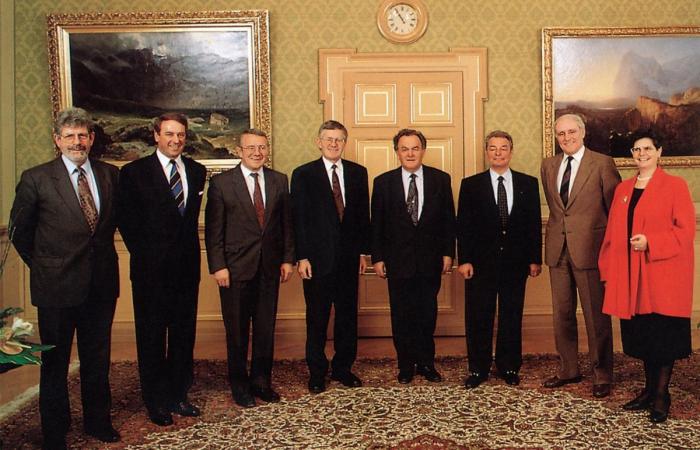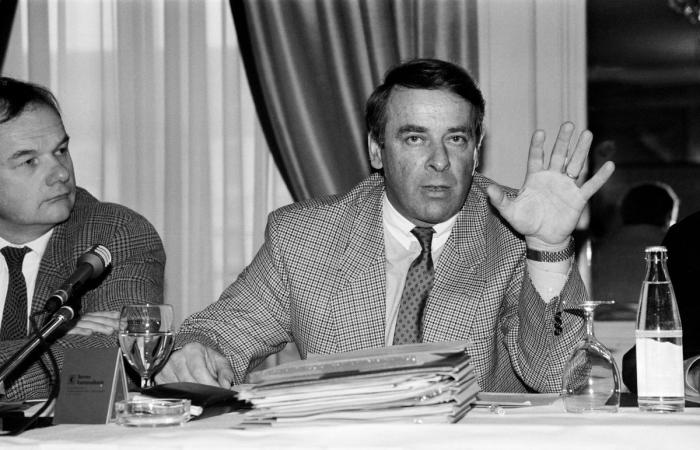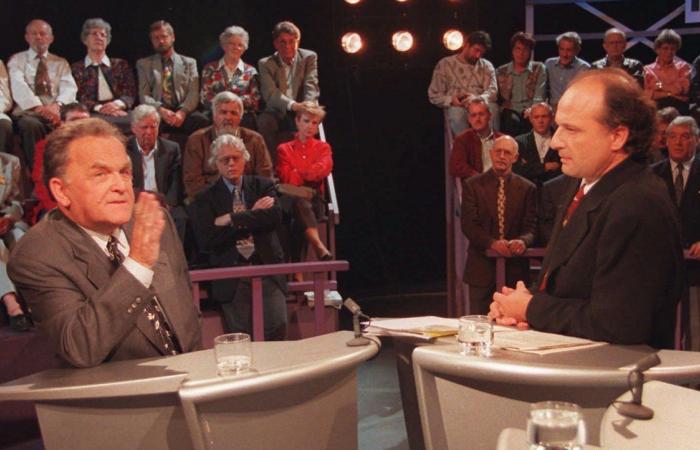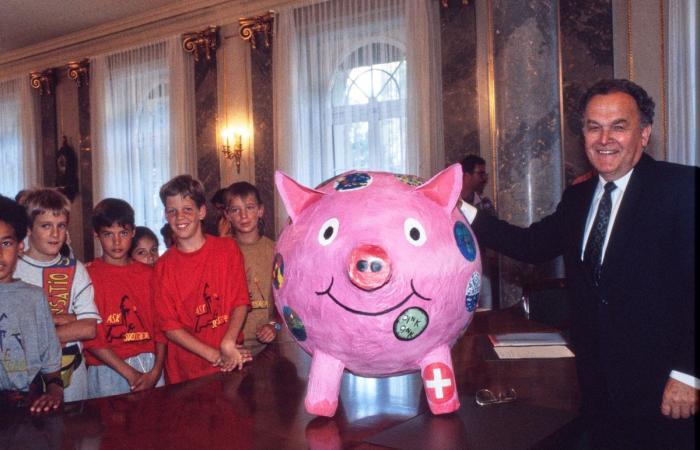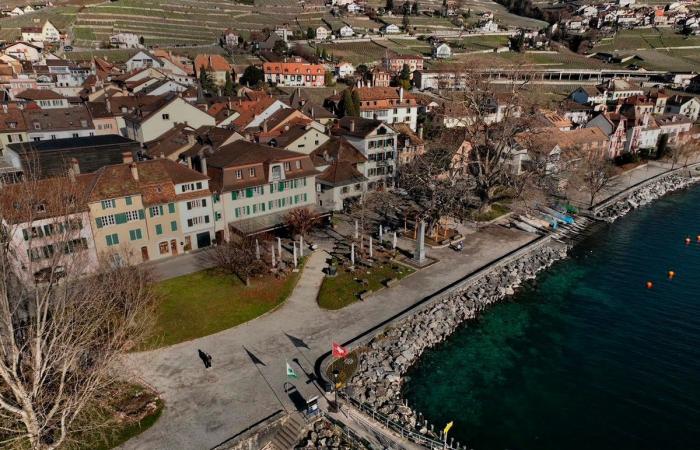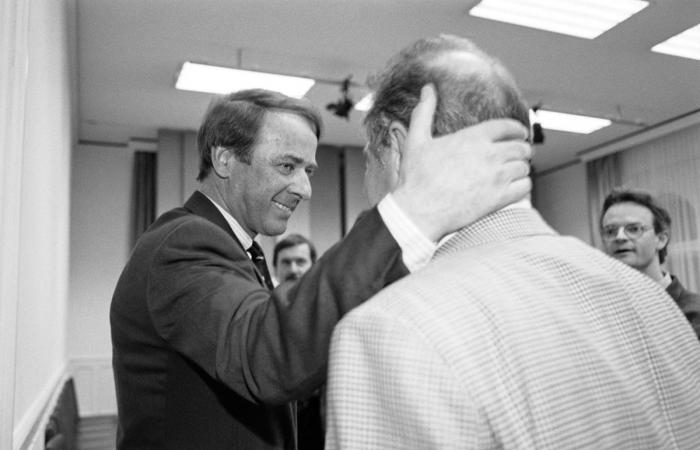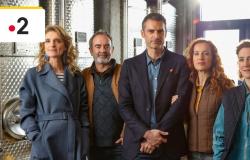ThosePreviously secret documents published –
“Switzerland is demolishing its Federal Council quietly but thoroughly”
In 1994, the seven Federal Councilors argued with the EU, the money, the people and, above all, with themselves. One member became particularly emotional during a discussion.
Published today at 7:21 am
Friendly faces, but a lot of arguments: The official Federal Council photo 1994. From left: Chancellor François Couchepin, Adolf Ogi, Arnold Koller, Kaspar Villiger, Otto Stich, Jean-Pascal Delamuraz, Flavio Cotti, Ruth Dreifuss.
Photo: Karl-Heinz Hug, Federal Chancellery (Keystone)
Subscribe now and benefit from the read-aloud function.
BotTalk
- In 1994, the Federal Council fell into a crisis of confidence after voting defeats.
- Adolf Ogi felt let down by the committee and demanded changes.
- A “conclave” in Cully was intended to strengthen cohesion in the Federal Council.
After the surprising No to highway expansion last November it was back again. The topic of the lost trust in the Federal Council – and the question: How does the state government have to pull itself together to win back the people?
The situation is not new. Documents from 1994 that have recently been released from secrecy show an example of how the seven members react to such voting defeats.
Ogi’s “Cry of the Heart”
The then Federal Councilor Adolf Ogi (SVP) made particularly emotional comments in a closed session. It was like his colleague Jean-Pascal Delamuraz (FDP) according to the protocol sensitively stated, a “crie de cœur” – Ogi’s “cry of the heart”.
The Federal Council had previously lost important proposals with explosive foreign policy power: the people contradicted the Federal Council and said Yes to the Alpine Initiativewhich restricted traffic over the Swiss passes. In doing so, Switzerland incurred the anger of its neighboring states and the EU. In addition, the voters rejected one Participation in the UN peacekeeping force ab.
Adolf Ogi fought on the front line against the Alpine Initiative – but it was accepted in February 1994. He reacted emotionally because he felt abandoned by the Federal Council.
Photo: Keystone
The defeats in the first half of 1994 were all the more severe because just two years earlier the Federal Council had had to abandon what had been its most important foreign policy project to date: accession to the EEA.
Federal Council engages in “brotherly fights”
There were “crushing defeats” and a “true loss of trust,” says Sacha Zala. The historian and his team from the Swiss Diplomatic Documents Research Center (Dodis) have on New Year’s Eve the most important documents and Federal Council minutes from 1994 were published. The waiting period of 30 years has expired.
On Wednesday, June 22, 1994, in the evening at 8:30 p.m., the government met in the Federal Palace for a “Chropfleerete” – and spoke plainly: “People have the feeling that the Federal Council is not able to solve the country’s problems,” said the only woman in the Federal Council at the time, Ruth Dreifuss (SP).
Defense Minister Kaspar Villiger (FDP) stated a “systematic dismantling of government activities by parliament and parties”. Delamuraz, on the other hand, identified the error in the committee itself: “The Federal Council appears to be a construct made up of seven individuals who are fighting among themselves.”
Christoph Blocher’s eroding power
Flavio Cotti (CVP, today’s center), on the other hand, named another culprit: “Mr. Blocher and his assistants exert a very strong eroding force.”
The EU-friendly foreign minister said the worst thing would be “to agree with Blocher and capitulate in our foreign policy efforts.” Ogi also argued with his party colleague Christoph Blocher: the Federal Councilors would have to run “from one fight to the other”.
Responsible for this: the “Arena” of Swiss television, which has personalized and emotionalized the voting battles for a year. “Blocher is always prepared for that,” said Ogi, “a communications specialist should help us.”

Federal President Otto Stich (left) is interviewed by presenter Filippo Leutenegger on the “Arena” program in 1994.
Photo: Oscar Alessio (Keystone)
Dispute over the EU – and money
The background to the “misery in the Federal Council,” which the NZZ stated at the time, was an “open dissent within the state government,” according to a high-ranking official officially recorded.
According to the historian Sacha Zala, two topics in particular led to the dispute: the European question, on which EU friends and skeptics were irreconcilably opposed in the Federal Council.
Just like today, the ailing federal finances were a cause for dispute back then: Otto Stich (SP), as finance minister, was hard on the spending brake, which was not always well received by the others.

A school class gave Otto Stich a giant piggy bank. Stich’s thrift made him popular, but only partially popular among his colleagues.
Photo: Dodis-70204
Above all, Stich warned of the expensive expansion of the railway network with two new tunnels on the Lötschberg and the Gotthard. These were again a matter close to Adolf Ogi’s heart.
“It became clear to the Federal Council that it had to better anchor its policies – especially foreign policy – in the people,” says historian Zala. Cotti put it this way in the National Council: The Federal Council is keen to pour “clear wine” and not present “confused wishy-washy”.
Does the Federal Council need a psychiatrist?
But nothing changed in the bad climate in the government. Ogi insisted, and in October the Federal Council discussed again how it should address the problem.
The then Federal Chancellor François Couchepin – a cousin of the later FDP Federal Councilor Pascal Couchepin – suggested at the special meeting that a “group dynamics specialist” be brought in.
Couchepin already had a name ready: Gottlieb Gunterna former goat and sheep herder from Valais who worked his way up to become a doctor and psychiatrist. After leaving psychiatry, Guntern devoted himself to “researching leadership and creativity.”
The minutes of the meeting make it clear how badly Couchepin’s suggestion was received by his (male) colleagues: “Federal President Stich wonders what could come out of this exercise,” it says. And Cotti feared that such group therapy would be poorly received by the media.
Ogi feels unhappy
Adolf Ogi insisted that it was necessary for the members of the Federal Council to speak out among themselves, “for example during a weekend in an isolated mountain station”.
Only Ruth Dreifuss supported him: “If a council member has the feeling that he is unhappy in the group and asks for joint considerations, it is not possible to refuse such a request.”
Dreifuss also found that the presence of a “supervisor” could be helpful.
The Conclave of Cully
Finally, it was agreed on a two-day meeting, not in the mountains, but in the Hôtel du Raisin, in Cully in Vaud, directly on Lake Geneva. It took place on December 18th and 19th and went as “Conclave” into the Federal Council annals.
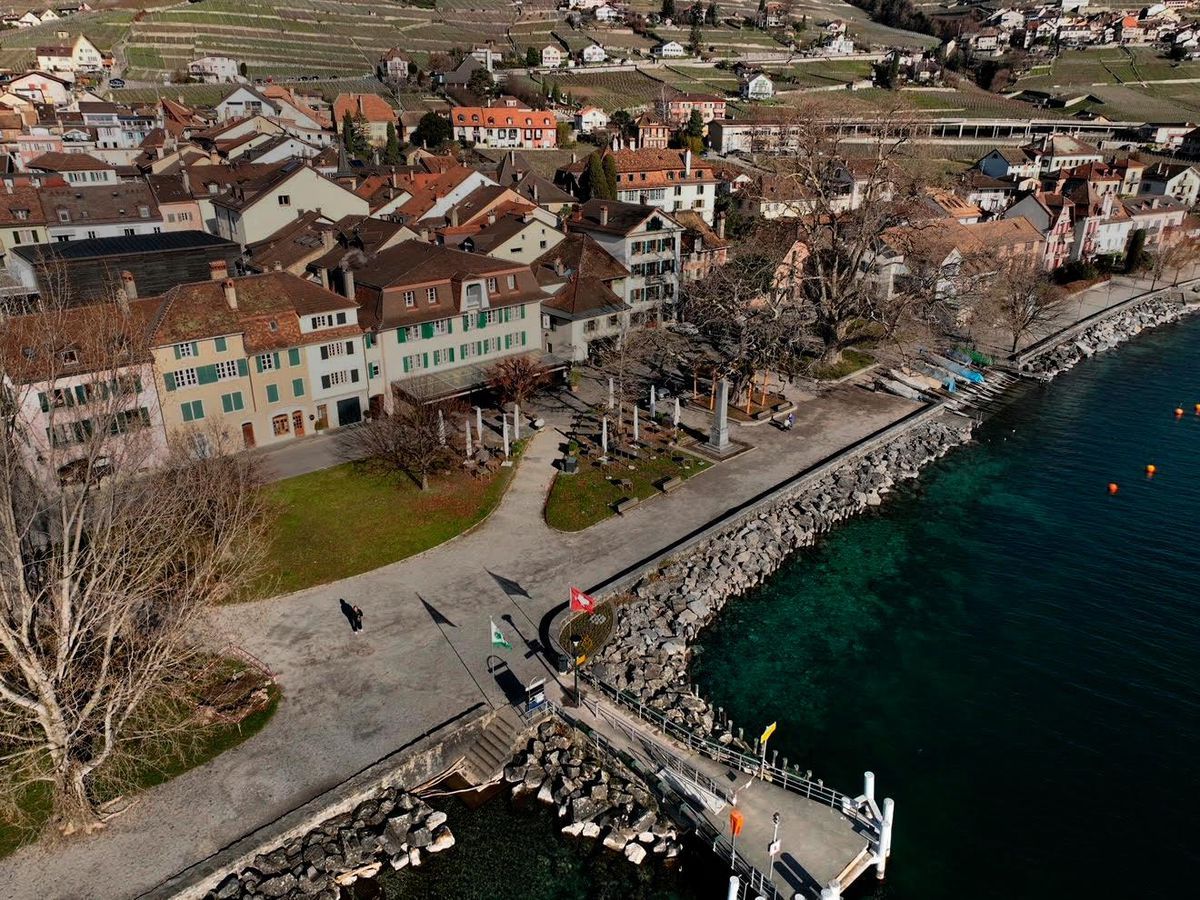
The Federal Council’s “conclave” took place in December 1994 in Cully, a picturesque village in Lavaux.
Photo: Patrick Martin
Ogi in particular expressed his frustration there. “Switzerland is demolishing its Federal Council quietly but thoroughly,” he said. This is also due to the fact that the collaboration is difficult. “We like each other,” he said, “but under pressure we irritate each other.” There isn’t enough time to “talk about things in Bode”.
The defeat in the Alpine Initiative was still deep in Ogi’s bones: he – as the responsible transport minister – felt left alone in the voting campaign. No colleague called him or contacted him in writing. “This pained me.”
Ogi against Sting
Ultimately, Otto Stich’s stubborn resistance to the railway expansion also gnawed at Ogi. In the event of an “amputation” of the project, he has three options: “withdraw, resign or try to continue.”
Now he wants to look for a solution with Stich. “However, the willingness to talk must be mutual,” he warned. However, Ogi added reassuringly that he would endeavor to “improve the relationship with the Federal President”.
According to the protocol, Jean-Pascal Delamuraz was the only one who reacted directly to Ogi’s “heart’s cry”.
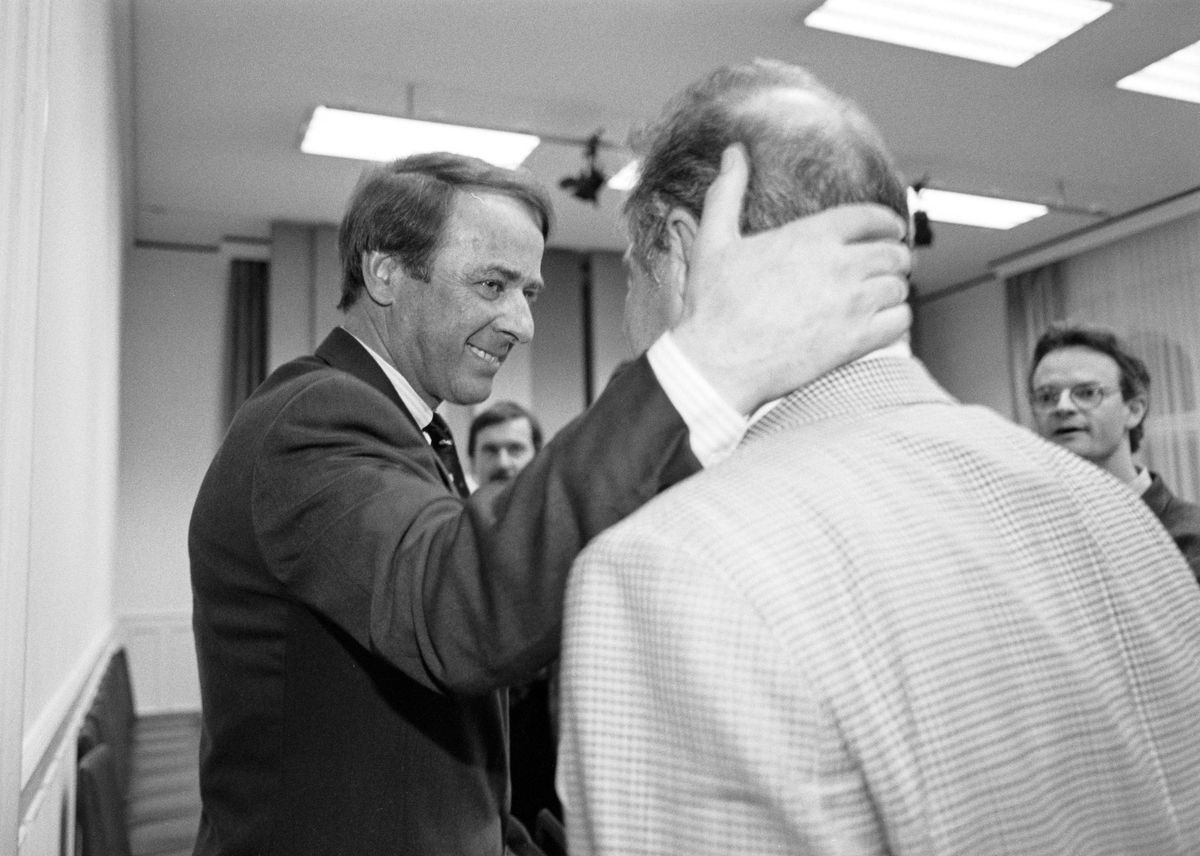
Jean-Pascal Delamuraz (with his back to the camera) is warmly greeted by Adolf Ogi at a press conference in 1994.
Foto: Karl-Heinz Hug (Keystone)
But everyone agreed that more attention should be paid to “human relationships” in the Federal Council. And Arnold Koller (CVP) quoted the sentence of a predecessor: “Mutual trust and spontaneous friendship” are prerequisites for cooperation in the Federal Council.
Ogi’s opponent Otto Stich took a first step towards this: he was pleased that Ogi was now seeking a conversation with him about the railway expansion.
Today we know that the relationship between the two remained frozen. Ogi came to the opening of the Lötschberg Base Tunnel in 2007 beaming with joy, but Stich was not invited – and he explained that he would not have come even if he had been invited because the whole thing was a mistake.
How relations in the Federal Council developed after the “Cully conclave” will be found out in detail in a year’s time. Sacha Zala and his team from the Dodis Research Center are already at work reviewing the 1995 documents and preparing them for publication on January 1, 2026.
The morning
The perfect start to the day with news and stories from Switzerland and the world.
More newsletters
Log in
Edgar Schuler is a domestic editor with a focus on politics and regularly writes the newsletter “Der Morgen”.More info
Found an error? Report now.
2 comments

